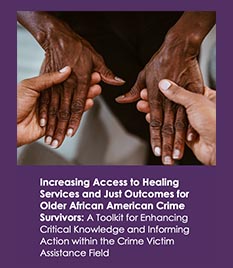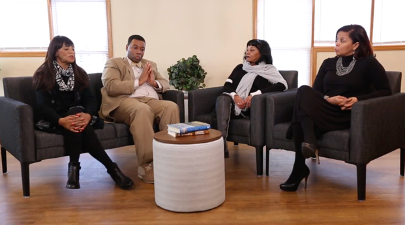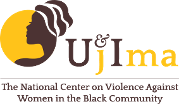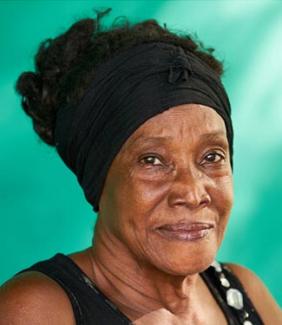By Juanita Davis, Associate Director for the National Clearinghouse on Abuse in Later Life (NCALL)
Older African Americans experience crime and violence at the intersection of race, age, class and other identities.
White supremacy doctrine and structural oppressions are omnipresent within social institutions in the United States and they are replicated within our social systems, including in the movement to end domestic violence. These barriers impede the capacity of many mainstream victim services advocates and domestic violence programs to effectively support older African American survivors. These systemic and institutional challenges leave older African American survivors vulnerable to future harms and without adequate access to the supports they need to deal with the violence they experience.
To address these challenges and increase access to healing services, mainstream advocates and programs must do the vital work of building literacy about the history of privilege, the impact of racism on the lived experiences of African Americans and the impact of intersecting oppressions in the context of domestic violence. These entities must also pro-actively identify, eliminate, and replace racially inequitable approaches to services and programming with methods which ensure equity in outcomes for older African American survivors.
 Enhancing Services and Supports to Older African American Survivors
Enhancing Services and Supports to Older African American Survivors
To support advocates and domestic violence programs in this critical work, earlier this year, the National Clearinghouse on Abuse in Later Life (NCALL), in collaboration with the National Resource Center on Reaching Victims created the Increasing Access to Healing Services and Just Outcomes for Older African American Crime Survivors toolkit. This three-part resource includes a content guide, a series of video clips (see below), and Reflections workbook. The content guide includes several learning modules and videos clips which examine the unique lived experiences of older African American survivors and the dynamics present for them as they attempt to navigate through inequitable and racialized victim services systems. The guide also provides a set of strategies to help advocates and programs address structural challenges and enhance services for older African American victims. Finally, the reflections workbook offers readers the opportunity to further apply the information and ideas shared in the modules to the context of their work and programs.
Some key strategies for enhancing services and supports to older African American survivors include: 1) building racial literacy, 2) moving beyond colorblindness, and 3) learning and unlearning.
1) Building Racial Literacy
While race and white supremacy are central organizing features in American society and within the systems and structures of the mainstream domestic violence movement, their role and impact on the movement’s work, particularly on racially marginalized victims, has been rendered nearly invisible by traditional domestic violence praxis and norms. Whether in the program design, partnership, or evaluation processes, or in the training of advocates and volunteers around racism and doing anti-racism advocacy work, mainstream domestic violence advocacy and programming broadly function to preserve a racially inequitable status quo where survivors of color – especially older African American survivors – are consistently underserved and unable to access the resources and assistance that they need.
In order to more effectively serve older African American survivors, mainstream domestic violence advocates and programs must develop racial literacy skills. These skills will allow mainstream advocates and programs to better recognize how racism and anti-Blackness inform their practices and negatively impact older African American survivors. Building racial literacy skills will also allow advocates and programs to understand how race and racism are influenced by other factors such as age, class, gender, and sexuality. This concept, known as intersectionality, was coined in 1989 by Black feminist legal scholar Kimberlé Williams Crenshaw. Last, mainstream domestic violence advocates and programs must also develop ways to meaningfully implement antiracist advocacy as a tool for increasing access to services and supports.
Advocates can explore many of these racial literacy concepts in the Increasing Access toolkit which includes prompts designed to build racial literacy. For example, advocates are asked to reflect on questions like those included below and to apply their answers to their work: 
- Older African Americans have experienced decades of race-based oppression and trauma. How can an understanding of this reality impact your work with older African American victims?
- What opportunities do you have to apply an intersectional lens to your work with older African American crime victims?
2) Moving Beyond Colorblindness
A common set of refrains within mainstream domestic violence advocacy and programming are that programs and advocates “serve all victims the same” or “we don’t see race” in our advocacy. Underscoring these kinds statements is the idea that a “one-size fits all” or a “colorblind” approach to advocacy and services is the most fair or equitable way to provide supports to survivors. Conversely, these notions also assume that any race-conscious advocacy undermines any attempts to achieve healing and just outcomes for victims.
Colorblind domestic violence advocacy in the context of a racialized system of domestic violence advocacy and services is fundamentally inequitable. Affirming the “sameness” amongst older victims does nothing to address how racial hierarchies and consolidated racial power within the structures of domestic violence advocacy negatively impact older African American survivors and continually reproduce racial inequitable outcomes. Further, colorblind domestic violence advocacy makes it so older Black survivors who raise concerns about how racism impacts their experiences are not treated as people with problems for which services can be provided, but as problems for the domestic violence system itself.
Colorblind advocacy creates a vicious cycle that must be interrupted so that older African American survivors receive the services they need and deserve. In the Increasing Access toolkit, mainstream advocates and programs are asked to think about ways to move beyond colorblindess in their work. To assist in that process, advocates are asked to reflect on questions like these:
- Acknowledgement of the complex racial, historical, and intergenerational trauma older African American victims face is a step towards creating more accessible spaces for healing and justice. In what ways can you incorporate this in the manner you approach your work?
- The process of learning and unlearning behaviors born from systemic racism and oppression is an ongoing and lifelong process. What are some steps you can take to move that process forward for yourself?
3) Learning and Unlearning
As parts of larger systems, mainstream domestic violence advocates and programs have a role to play in transforming the way things have always been done. Older African American victims are often forced to access services with the additional trauma or fear of navigating anti-Blackness, while also navigating the harm done to them by their victimization. The systemic racism reinforcing this impossible choice for victims is a norm and dismantling this all-encompassing conditioning requires a learning process that ultimately results in an unlearning of engrained behaviors.
To learn more about ways to enhance your advocacy and programs to better respond to older African American victims and to learn more about this resource, visit NCALL’s website.
Additional resources for advocates and programs:
Organizations:
![]() The National Clearinghouse on Abuse in Later Life (NCALL) – provides technical assistance, consultation, and training to professionals and the public on abuse in later life and elder abuse. NCALL trainers are available to provide information to professionals and volunteers working in domestic violence and sexual assault programs, culturally specific programs, the aging services network, adult protective services, health care, the criminal and civil justice systems, faith communities, and other organizations. NCALL has created information sheets, curricula, toolkits, videos, webinars, web graphics, and posters on a variety of topics for various audiences related to abuse in later life and unique issues facing older adults and survivors of abuse.
The National Clearinghouse on Abuse in Later Life (NCALL) – provides technical assistance, consultation, and training to professionals and the public on abuse in later life and elder abuse. NCALL trainers are available to provide information to professionals and volunteers working in domestic violence and sexual assault programs, culturally specific programs, the aging services network, adult protective services, health care, the criminal and civil justice systems, faith communities, and other organizations. NCALL has created information sheets, curricula, toolkits, videos, webinars, web graphics, and posters on a variety of topics for various audiences related to abuse in later life and unique issues facing older adults and survivors of abuse.
NCALL trainers are available to provide information to professionals and volunteers working in domestic violence and sexual assault programs, culturally specific programs, the aging services network, adult protective services, health care, the criminal and civil justice systems, faith communities, and other organizations. NCALL has created information sheets, curricula, toolkits, videos, webinars, web graphics, and posters on a variety of topics for various audiences related to abuse in later life and unique issues facing older adults and survivors of abuse.
 The National Resource Center for Reaching Victims (NRC) – funded by the federal Office for Victims of Crime (OVC), the NRC is a one-stop shop for victim service providers, culturally specific organizations, justice system professionals, and policymakers to get information and expert guidance to enhance their capacity to identify, reach, and serve all victims, especially those from communities that are underrepresented in healing services and avenues to justice.
The National Resource Center for Reaching Victims (NRC) – funded by the federal Office for Victims of Crime (OVC), the NRC is a one-stop shop for victim service providers, culturally specific organizations, justice system professionals, and policymakers to get information and expert guidance to enhance their capacity to identify, reach, and serve all victims, especially those from communities that are underrepresented in healing services and avenues to justice.
 Ujima: The National Center on Violence Against Women in the Black Community – serves as a national, culturally-specific services issue resource center to provide support to and be a voice for the Black Community in response to domestic, sexual and community violence. “Ujima acts as a voice for the African diaspora by engaging the Black community at its core. Adhering to the principle of collective work and responsibility, we work to heal our communities through the engagement of its people.”
Ujima: The National Center on Violence Against Women in the Black Community – serves as a national, culturally-specific services issue resource center to provide support to and be a voice for the Black Community in response to domestic, sexual and community violence. “Ujima acts as a voice for the African diaspora by engaging the Black community at its core. Adhering to the principle of collective work and responsibility, we work to heal our communities through the engagement of its people.”
Other Resources:
Increasing Access Toolkit Virtual Learning – this webinar introduces information to learn about a new resource for the crime victims field, the Increasing Access to Healing Services and Just Outcomes for Older African American Crime Survivors toolkit. Through a series of guided conversations, participants in this event will interface with the different parts of this toolkit, including content modules, video clips, and a reflections workbook. The webinar also includes guided dialogues with subject matter experts and NCALL staff about specific strategies to enhancing services for older African American victims in their work.
NCALL Older Victims of Crime Trainers and Educators Forum – this forum is a virtual peer-to-peer exchange where participants can learn from each other, get feedback on new ideas, share educational and training resources, discuss helpful tips and tools to use in training work, and make connections on training topics impacting older crime victims. Topics on the forum include advancing principles of anti-oppression and equitable access, ageism and its impact on accessing services, and increasing access to healing services and just outcomes for older African American survivors.














